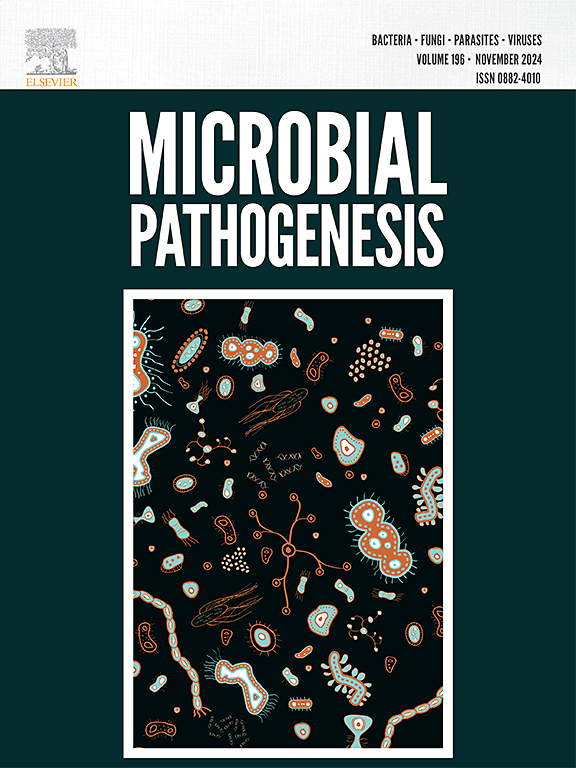子痫前期小鼠模型中肠道菌群失调对肠道屏障完整性和全身炎症的影响
IF 3.5
3区 医学
Q3 IMMUNOLOGY
引用次数: 0
摘要
子痫前期的特点是全身性炎症和内皮功能障碍,越来越多的证据表明肠道微生物群在其发病机制中起重要作用。本研究在小鼠模型中研究了来自子痫前期和健康供体的粪便微生物群移植对肠道屏障完整性和全身炎症的影响。将子痫前期孕妇和健康孕妇的粪便菌液移植到假不育小鼠体内。采用PCR、Western Blot和免疫组织化学检测结肠组织ZO-1和Occludin的表达。采用ELISA法测定尿蛋白、血清脂多糖(LPS)、TNF-α、IL-6水平。子痫前期和健康供体的粪便微生物群移植对小鼠的组织形态没有影响,但在子痫前期模型组(PET)中显著损害了肠道屏障的完整性。这是由紧密连接蛋白TJP1和Occludin的水平降低所表明的。PET组尿蛋白水平升高(4456.24±1509.05 μg/ml),血清LPS(10.26±3.91 μg/ml)、TNF-α(13.34±1.07 pg/ml)和IL-6(16.48±5.33 pg/ml)水平升高,提示子痫前期全身炎症与肠道菌群失调相关。本研究提示子痫前期患者肠道菌群失调可能破坏肠道屏障功能,加重全身性炎症。然而,由于供体数量和实验条件的限制,具体机制仍需进一步研究。本文章由计算机程序翻译,如有差异,请以英文原文为准。
Impact of gut microbiota dysbiosis on intestinal barrier integrity and systemic inflammation in a pre-eclampsia mouse model
Pre-eclampsia is characterized by systemic inflammation and endothelial dysfunction, with growing evidence suggesting a significant role for gut microbiota in its pathogenesis. This study investigated the effects of fecal microbiota transplantation from pre-eclamptic and healthy donors on intestinal barrier integrity and systemic inflammation in a mouse model. Fecal bacteria solutions from pre-eclamptic and healthy pregnant women were transplanted into pseudo-sterile mice. The expression of ZO-1 and Occludin in colon tissue was assessed using PCR, Western Blot, and immunohistochemistry. Urinary protein content, serum lipopolysaccharide (LPS), TNF-α, and IL-6 levels were measured by ELISA. Fecal microbiota transplantation from pre-eclamptic and healthy donors did not affect tissue morphology in mice but significantly compromised intestinal barrier integrity in the pre-eclampsia model group (PET). This was indicated by reduced levels of the tight junction proteins TJP1 and Occludin. The PET group also exhibited elevated urinary protein levels (4456.24 ± 1509.05 μg/ml) and increased serum levels of LPS (10.26 ± 3.91 μg/ml), TNF-α (13.34 ± 1.07 pg/ml), and IL-6 (16.48 ± 5.33 pg/ml), underscoring systemic inflammation associated with gut microbiota dysbiosis in pre-eclampsia. This study indicates that the dysregulation of the intestinal microbiota in patients with preeclampsia may disrupt the intestinal barrier function and exacerbate systemic inflammation. However, due to the limited number of donors and experimental conditions, the specific mechanism still requires further investigation.
求助全文
通过发布文献求助,成功后即可免费获取论文全文。
去求助
来源期刊

Microbial pathogenesis
医学-免疫学
CiteScore
7.40
自引率
2.60%
发文量
472
审稿时长
56 days
期刊介绍:
Microbial Pathogenesis publishes original contributions and reviews about the molecular and cellular mechanisms of infectious diseases. It covers microbiology, host-pathogen interaction and immunology related to infectious agents, including bacteria, fungi, viruses and protozoa. It also accepts papers in the field of clinical microbiology, with the exception of case reports.
Research Areas Include:
-Pathogenesis
-Virulence factors
-Host susceptibility or resistance
-Immune mechanisms
-Identification, cloning and sequencing of relevant genes
-Genetic studies
-Viruses, prokaryotic organisms and protozoa
-Microbiota
-Systems biology related to infectious diseases
-Targets for vaccine design (pre-clinical studies)
 求助内容:
求助内容: 应助结果提醒方式:
应助结果提醒方式:


